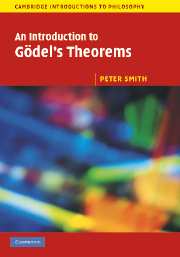Book contents
- Frontmatter
- Contents
- Preface
- 1 What Gödel's Theorems say
- 2 Decidability and enumerability
- 3 Axiomatized formal theories
- 4 Capturing numerical properties
- 5 The truths of arithmetic
- 6 Sufficiently strong arithmetics
- 7 Interlude: Taking stock
- 8 Two formalized arithmetics
- 9 What Q can prove
- 10 First-order Peano Arithmetic
- 11 Primitive recursive functions
- 12 Capturing p.r. functions
- 13 Q is p.r. adequate
- 14 Interlude: A very little about Principia
- 15 The arithmetization of syntax
- 16 PA is incomplete
- 17 Gödel's First Theorem
- 18 Interlude: About the First Theorem
- 19 Strengthening the First Theorem
- 20 The Diagonalization Lemma
- 21 Using the Diagonalization Lemma
- 22 Second-order arithmetics
- 23 Interlude: Incompleteness and Isaacson's conjecture
- 24 Gödel's Second Theorem for PA
- 25 The derivability conditions
- 26 Deriving the derivability conditions
- 27 Reflections
- 28 Interlude: About the Second Theorem
- 29 µ-Recursive functions
- 30 Undecidability and incompleteness
- 31 Turing machines
- 32 Turing machines and recursiveness
- 33 Halting problems
- 34 The Church–Turing Thesis
- 35 Proving the Thesis?
- 36 Looking back
- Further reading
- Bibliography
- Index
23 - Interlude: Incompleteness and Isaacson's conjecture
Published online by Cambridge University Press: 05 June 2012
- Frontmatter
- Contents
- Preface
- 1 What Gödel's Theorems say
- 2 Decidability and enumerability
- 3 Axiomatized formal theories
- 4 Capturing numerical properties
- 5 The truths of arithmetic
- 6 Sufficiently strong arithmetics
- 7 Interlude: Taking stock
- 8 Two formalized arithmetics
- 9 What Q can prove
- 10 First-order Peano Arithmetic
- 11 Primitive recursive functions
- 12 Capturing p.r. functions
- 13 Q is p.r. adequate
- 14 Interlude: A very little about Principia
- 15 The arithmetization of syntax
- 16 PA is incomplete
- 17 Gödel's First Theorem
- 18 Interlude: About the First Theorem
- 19 Strengthening the First Theorem
- 20 The Diagonalization Lemma
- 21 Using the Diagonalization Lemma
- 22 Second-order arithmetics
- 23 Interlude: Incompleteness and Isaacson's conjecture
- 24 Gödel's Second Theorem for PA
- 25 The derivability conditions
- 26 Deriving the derivability conditions
- 27 Reflections
- 28 Interlude: About the Second Theorem
- 29 µ-Recursive functions
- 30 Undecidability and incompleteness
- 31 Turing machines
- 32 Turing machines and recursiveness
- 33 Halting problems
- 34 The Church–Turing Thesis
- 35 Proving the Thesis?
- 36 Looking back
- Further reading
- Bibliography
- Index
Summary
This Interlude discusses a couple of further questions about incompleteness that might well have occurred to you as you have been reading through recent chapters. But, given that the chapters since the last Interlude have been quite densely packed, we should probably begin with a quick review of where we've been.
Taking stock
Here's some headline news which is worth highlighting again:
First, we showed that the restriction of the First Theorem to p.r. axiomatized theories is in fact no real restriction. Appealing to a version of Craig's Theorem, we saw that the incompleteness result applies equally to any consistent axiomatized theory which contains Q (or, indeed, is otherwise p.r. adequate). (Section 19.1)
But our pivotal new result was Theorem 20.4, the general Diagonalization Lemma: if T is a nice theory and ϕ(x) is any wff of its language with one free variable, then there is a ‘fixed point’ γ such that T ⊢ γ ↔ ϕ(⌜γ⌝). And further, if ϕ(x) is Π1, then it has a Π1 fixed point. (Section 20.5)
We then proved the rather easy Theorem 21.1: if γ is any fixed point for ¬ProvT(x), then, if T is nice, T ⊬ γ, and if T is also ω-consistent, then T ⊬ ¬γ. Since the Diagonalization Lemma tells us that there is a fixed point for ¬ProvT(x), that gives us the standard incompleteness theorem again.
[…]
- Type
- Chapter
- Information
- An Introduction to Gödel's Theorems , pp. 199 - 211Publisher: Cambridge University PressPrint publication year: 2007



